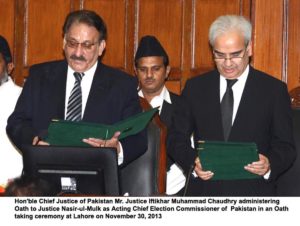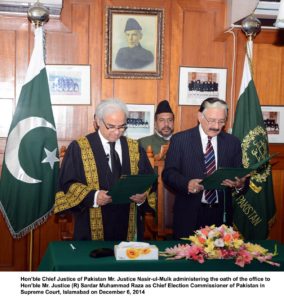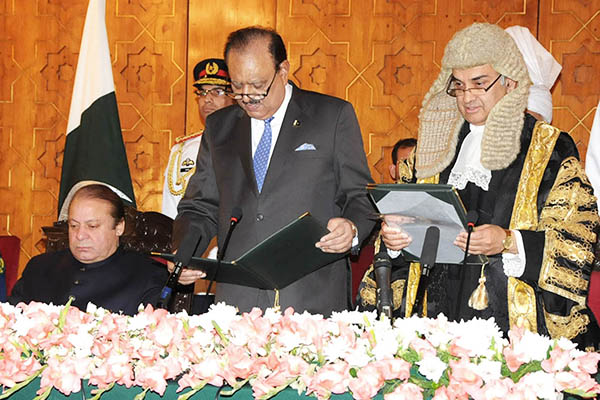
Profile:
Justice (R) Nasir-ul-Mulk,
Justice Nasir-ulMulk’s father Senator Kamran Khan was member of the first Senate of Pakistan (1973) from the platform of National Awami Party. His brother Senator ShujaulMulk served from 2003-2009 from the platform of Pakistan People’s Party-Sherpao. Hailing from a political family, Justice Mulk opted for judicial career and became the 22nd Chief Justice of Pakistan. Justice Mulk also served as Acting Chief Election Commissioner of Pakistan.
 Justice Nasir-ul-Mulk was a barrister-at-law of the Inner Temple, London. He was elected as secretary general, Peshawar High Court Bar Association in 1981.
Justice Nasir-ul-Mulk was a barrister-at-law of the Inner Temple, London. He was elected as secretary general, Peshawar High Court Bar Association in 1981.
In 1993, he was appointed as the advocate general of Khyber Pakhtunkhwa, formerly known as North-West Frontier Province. A year later, in 1994, he was appointed as the judge of Peshawar High Court.He was elevated as chief justice of Peshawar High Court on May 31, 2004, and as a Supreme Court judge on April 4, 2005.
Justice Mulk was one of the seven judges who signed a restraining order on November 3, 2007, when former president General (retd) Pervez Musharraf imposed emergency and forcibly sent the judges home. He later joined the judiciary on September 20, 2008, under the Naek formula when he took a fresh oath as a judge of the Supreme Court with his seniority intact.
 He authored the verdict favouring former Prime Minister Nawaz Sharif’s in the plane hijacking case. The verdict paved the way for Nawaz to return to politics.
He authored the verdict favouring former Prime Minister Nawaz Sharif’s in the plane hijacking case. The verdict paved the way for Nawaz to return to politics.
The retired judge also headed the seven-member bench that convicted former Prime MinisterYousufRazaGillani for not writing a letter to the Swiss authorities to reopen graft cases against then president Asif Ali Zardari. After the verdict, Gillani was disqualified as the prime minister.Moreover, Justice Mulk headed the commission formed to probe the allegations of 2013 polls being rigged.
Now his challenge is to facilitate smooth civilian to civilian transition.


